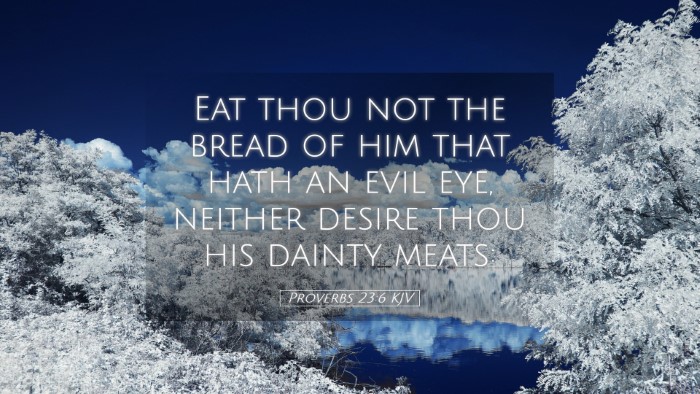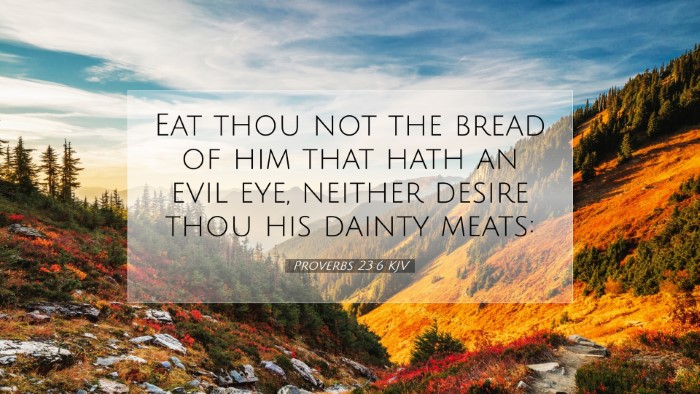Commentary on Proverbs 23:6
The verse Proverbs 23:6 states:
"Eat thou not the bread of him that hath an evil eye, neither desire thou his dainty meats."
Introduction
This verse serves as a cautionary reminder about the nature of relationships and the intentions that may lie behind generosity. The metaphor of "eating bread" symbolizes the deeper communion and fellowship shared with others, especially during times of hospitality. The “evil eye” signifies a heart filled with greed or malice, suggesting that one should be wary of those who appear generous but may harbor ulterior motives.
Insights from Public Domain Commentaries
Matthew Henry's Commentary
Matthew Henry emphasizes the moral implications of this verse, stating that:
- There is great danger in accepting the generosity of those who are wicked or have insincere intentions.
- In accepting their offerings, one may inadvertently become associated with their evil deeds.
- Henry points out that the "evil eye" symbolizes not only greed but also suspicion and envy, qualities that often corrupt the soul.
This commentary calls for discernment in relationships, urging believers to align with those whose hearts are right before God. Temptations often come cloaked in seemingly harmless gifts; hence, Henry advises caution and wisdom in such interactions.
Albert Barnes' Notes on the Bible
Barnes elaborates on the implications of indulging in the hospitality of those with an "evil eye." He highlights several key themes:
- The nature of the "evil eye": This is indicative of a selfish heart that seeks to manipulate or control others.
- Spiritual discernment: Barnes calls the reader to develop spiritual insight in distinguishing between genuine and self-serving gestures.
- Social dynamics: By partaking in the offerings of the wicked, one risks becoming entangled in their schemes and losing personal integrity.
He advises believers to engage with those who reflect godly virtues and to be wary of those whose intentions are not pure, reinforcing the idea of spiritual accountability in our circles of influence.
Adam Clarke's Commentary
Adam Clarke provides an intricate analysis of the social and ethical contexts surrounding this proverb:
- Evaluating relationships: Clarke underscores the importance of evaluating the moral fiber of potential friends, encouraging believers to refrain from close ties with those who do not fear God.
- Understanding the context: The invitation to dine may come from someone desiring a form of control or manipulation, thus it is essential to discern their motives.
- Spiritual implications: Clarke warns that sharing company with the wicked may lead to compromise in one's own spiritual walk.
His commentary thus emphasizes that true communion ought to spring from shared values and mutual respect for God's commands, rather than from self-serving interests.
Theological Implications
This verse invites deep reflection on the nature of our interactions with others. The Bible consistently warns about the influence of bad company, as echoed in 1 Corinthians 15:33, which states, “Be not deceived: evil communications corrupt good manners.”
Relationship with God
Engaging with those who have nefarious intentions can not only lead to negative consequences in our social lives but can also affect our relationship with God. The choices we make reflect our values and beliefs, and associating with the wicked can jeopardize our spiritual integrity.
Community and Integrity
Pastors and community leaders must take heed of Proverbs 23:6 when guiding their congregations. A healthy church community is one that encourages godly relationships that are grounded in faith and mutual respect for God’s commandments.
Practical Applications
In light of this examination, several practical applications emerge:
- Discernment in Relationships: Seek the counsel of the wise and godly, ensuring that relationships promote spiritual growth rather than compromise.
- Integrity in Hospitality: When sharing meals or engaging in fellowship, do so with individuals who exhibit righteousness and sincerity.
- Praying for Wisdom: In decision-making regarding relationships, continuously seek God’s wisdom through prayer and the study of Scripture.
Conclusion
Finally, Proverbs 23:6 serves as a poignant reminder of the importance of circumspect living. By exercising caution in our interactions and fostering relationships that reflect the character of Christ, we honor our commitment to holy living. Heed the wisdom embedded in this proverb, and let it guide your relational choices for a life that glorifies God.


